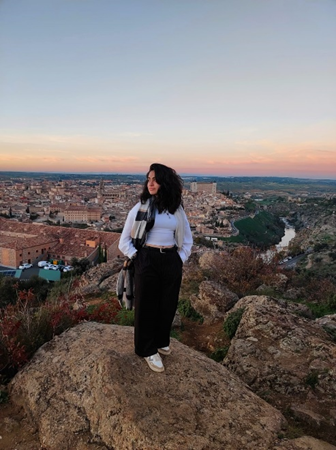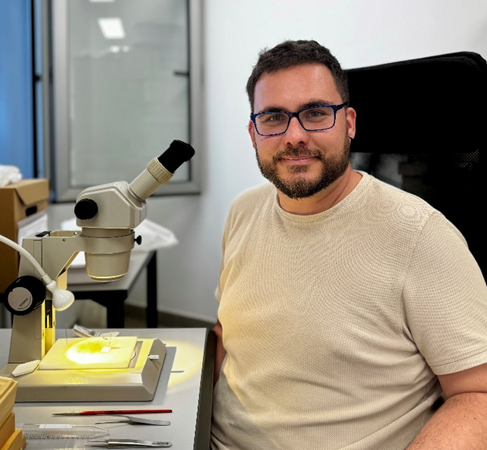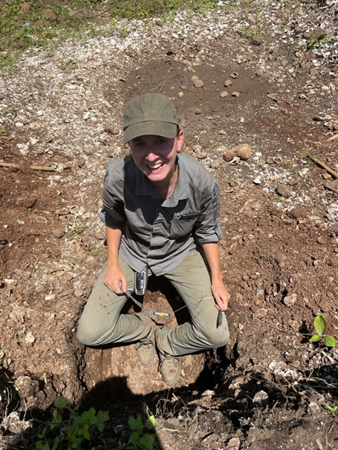Congratulations to the 2025 awardees of the new Beta-SAS Radiocarbon Dating Award! This annual award is designed to facilitate research into geographically and thematically underrepresented areas of radiocarbon dating. This year’s awardees will push the boundaries of radiocarbon research with an examination of the process of neolithization in the inland regions of the Iberian Peninsula through Bayesian modeling (Estíbaliz Espada-Martín), analysis of insects from a prehistoric cave in Granada, Spain to understand prehistoric funerary activity (Pedro Henríquez Valido), and the establishment of a chronological sequence for Southern Honduras, key for understanding the region and its interactions with Mesoamerica and Southern Central America (Marie Kolbenstetter). Congratulations to Estíbaliz, Pedro, and Marie, and thanks to Beta Analytic for their support of these early career scholars! We look forward to following their results!
Estíbaliz Espada-Martín (Universidad Autónoma de Madrid) "Neolithization of the Iberian Peninsula: Radiocarbon Dating of a Negative Structure in the Middle Tajo Basin (El Congosto, Rivas-Vaciamadrid, Madrid)

The process of neolithization on the Iberian Peninsula has traditionally been studied in coastal regions, with the interior areas being largely overlooked. Recent research, however, has revealed significant cultural diversity within the Meseta, particularly in the middle Tagus basin. This region faces notable chronological challenges due to the scarcity, complicating the establishment of an accurate timeline for the Neolithic period. In response, this project will secure an accurate date for a negative structure located at El Congosto. By analyzing specific samples, the research will integrate the new data into Bayesian models, refining the Neolithic chronological framework. This improved timeline will significantly enhance our understanding of the evolution of cultural and technological traditions in this under-explored part of the Iberian Peninsula, providing new insights into the processes underlying neolithization.
Estíbaliz is currently a PhD candidate funded by the Spanish Ministry of Universities. Her research focuses on Neolithic pottery production from the middle basin of the Tagus River in central Spain. The primary goal of this work is to reconstruct pottery technologies and manufacturing traditions of prehistoric communities in central Iberia. To achieve this, she employs ceramic petrography, X-ray diffraction (XRD), and X-ray fluorescence (XRF). Additionally, she has a strong interest in culinary practices, especially those related to dairy processing and consumption.
Pedro Henríquez Valido (Universidad de Alcalá, Área de Prehistoria) "Dating of insects associated with cadaveric decomposition in a prehistoric context at La Cueva de Los Murciélagos de Albuñol (Granada, Spain)”

The archaeological remains in this cave have been removed as a result of mining activities in the 19th century. However, the preservation of the organic remains in this site is spectacular, which has made it possible to preserve not only insects, but also the remains of arrows and the oldest basketry in Europe. The insects recovered and their chronological contextualization will allow us to know the times of occupation of the cave as a funerary space, but also to try to locate where the cadaveric deposits were located. Pedro’s career has focused on the study of archaeobotanical and archaeoentomological remains in storage contexts. During his thesis he worked on this type of materials in granaries excavated in caves by the indigenous population of the Canary Islands (N.W. Africa continent, Spain), and he is currently studying insects associated with cadaveric decomposition in prehistoric contexts.
Marie Kolbenstetter (Leiden University/Université Paris Nanterre) "Chronology building for precolonial Southern Honduras”

By revisiting eight key sites in Southern Honduras and conducting AMS radiocarbon dating on four of them, the awarded project proposes to reassess the existing cultural sequence for the region and anchor it in absolute chronology. This chronological reassessment will enable a reevaluation of existing archaeological data, and serve as a foundation for future archaeological work in the region. The results will also play an essential role in facilitating regional comparisons with Mesoamerica and Southern Central America. In this, the Beta-SAS Radiocarbon Dating Award provides essential support for building chronology in a region where absolute dating remains sparse. Marie's broader research interests lie with interaction and the construction of local identities in Central America. Her current work explores how both precolonial and modern practices have shaped, and continue to shape, local identities in Southern Honduras, where she has been leading her own archaeological project since 2021. In her dissertation research, she combines data from archaeological and ethnographic fieldwork to investigate how ceramic and lithic technology, ritual practices, and fishing and mollusk harvesting activities contribute to the construction of place, territory, and social landscapes in the Gulf of Fonseca.
